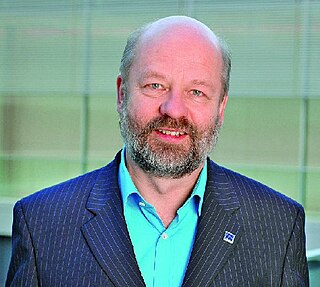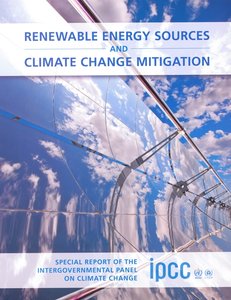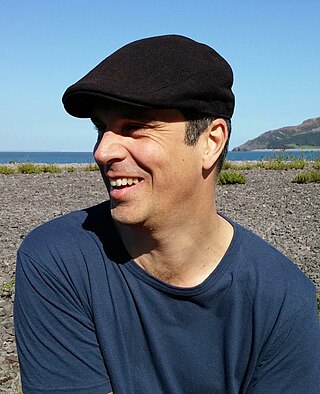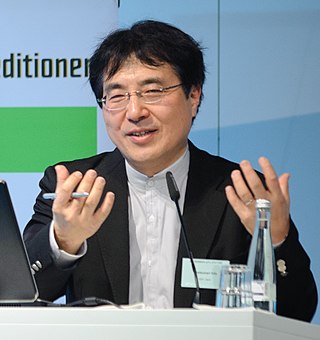Related Research Articles

Renewable energy is energy from renewable natural resources that are replenished on a human timescale. The most widely used renewable energy types are solar energy, wind power and hydropower. Bioenergy and geothermal power are also significant in some countries. Some also consider nuclear power a renewable power source, although this is controversial. Renewable energy installations can be large or small and are suited for both urban and rural areas. Renewable energy is often deployed together with further electrification. This has several benefits: electricity can move heat and vehicles efficiently, and is clean at the point of consumption. Variable renewable energy sources are those that have a fluctuating nature, such as wind power and solar power. In contrast, controllable renewable energy sources include dammed hydroelectricity, bioenergy, or geothermal power.

Energy development is the field of activities focused on obtaining sources of energy from natural resources. These activities include the production of renewable, nuclear, and fossil fuel derived sources of energy, and for the recovery and reuse of energy that would otherwise be wasted. Energy conservation and efficiency measures reduce the demand for energy development, and can have benefits to society with improvements to environmental issues.

Energy is sustainable if it "meets the needs of the present without compromising the ability of future generations to meet their own needs." Definitions of sustainable energy usually look at its effects on the environment, the economy and society. These impacts range from greenhouse gas emissions and air pollution to energy poverty and toxic waste. Renewable energy sources such as wind, hydro, solar, and geothermal energy can cause environmental damage, but are generally far more sustainable than fossil fuel sources.

REN21 is a policy network and a multistakeholder governance group which is focused on renewable energy policy.

Renewable energy commercialization involves the deployment of three generations of renewable energy technologies dating back more than 100 years. First-generation technologies, which are already mature and economically competitive, include biomass, hydroelectricity, geothermal power and heat. Second-generation technologies are market-ready and are being deployed at the present time; they include solar heating, photovoltaics, wind power, solar thermal power stations, and modern forms of bioenergy. Third-generation technologies require continued R&D efforts in order to make large contributions on a global scale and include advanced biomass gasification, hot-dry-rock geothermal power, and ocean energy. In 2019, nearly 75% of new installed electricity generation capacity used renewable energy and the International Energy Agency (IEA) has predicted that by 2025, renewable capacity will meet 35% of global power generation.

Steven A. Cohen is an American academic who has taught public management and environmental policy at Columbia University since 1981. He is the former executive director of Columbia University's Earth Institute and now serves as a senior advisor for the institute. He is a professor in the practice of public affairs at Columbia University's School of International and Public Affairs. He is also the director of the Master of Public Administration in Environmental Science and Policy in the School of International and Public Affairs and the director of the Master of Science in Sustainability Management in the School of Professional Studies. He served on the Environmental Protection Agency Administrator's National Advisory Council for Environmental Policy and Technology (2002–2004). He currently serves on the board of directors of Homes for the Homeless, faculty advisory committee for the Porter School of Environmental Studies at Tel Aviv University, and the admissions committee of the Lotos Club. Cohen is the lead independent director of the board of directors of the Willdan Group, Inc. Cohen also sits on the judging committee for the Yidan Prize Foundation. He served on the advisory board of the University of Minnesota's Institute on the Environment (2016-2022).

Hans-Josef Fell is a German former politician who was a member of the German Bundestag from 1998 to 2013. A member of Alliance 90/The Greens, he co-authored the 2000 draft of the Renewable Energy Sources Act alongside Hermann Scheer, establishing the foundation for the technology developments in photovoltaic, biogas, wind power and geothermal energy in Germany. Fell is founder and president of the Energy Watch Group and an internationally renowned energy and climate change advisor, author and speaker.

The renewable-energy industry is the part of the energy industry focusing on new and appropriate renewable energy technologies. Investors worldwide have paid greater attention to this emerging industry in recent years. In many cases, this has translated into rapid renewable energy commercialization and considerable industry expansion. The wind power, solar power and hydroelectric power industries provide good examples of this.

The United Nations Intergovernmental Panel on Climate Change (IPCC) published a special report on Renewable Energy Sources and Climate Change Mitigation (SRREN) on May 9, 2011. The report developed under the leadership of Ottmar Edenhofer evaluates the global potential for using renewable energy to mitigate climate change. This IPCC special report provides broader coverage of renewable energy than was included in the IPCC's 2007 climate change assessment report, as well as stronger renewable energy policy coverage.
The International Renewable Energy Conference (IREC) is a meeting of senior-level representatives, such as those from the Executive and Legislative branches of national or sub-national governments, international organizations, the finance and business community, or civil societies, working towards the advancement and integration of renewable energy in their countries.

100% renewable energy is the goal of the use renewable resources for all energy. 100% renewable energy for electricity, heating, cooling and transport is motivated by climate change, pollution and other environmental issues, as well as economic and energy security concerns. Shifting the total global primary energy supply to renewable sources requires a transition of the energy system, since most of today's energy is derived from non-renewable fossil fuels.
The International Hydropower Association (IHA) is an international lobby group and membership association representing the global hydropower sector.

Miguel Mendonça is an Anglo-Azorean writer and musician based in Bristol, England.
Renewable energy is generally defined as energy that comes from resources which are naturally replenished on a human timescale, such as sunlight, wind, rain, tides, waves, and geothermal heat. Renewable energy replaces conventional fuels in four distinct areas: electricity generation, air and water heating/cooling, motor fuels, and rural (off-grid) energy services. Based on REN21's 2014 report, renewables contributed 19 percent to our global energy consumption and 22 percent to our electricity generation in 2012 and 2013, respectively.

Energy in Sweden is characterized by relatively high per capita production and consumption, and a reliance on imports for fossil fuel supplies.

Tetsunari Iida is director of the Institute for Sustainable Energy Policies in Japan. Following the Fukushima nuclear disaster, he is calling for a decrease in Japan's reliance on nuclear power and an increase in renewable energy use.

Sir James Ferguson "Jim" Skea CBE FRSE is a British academic. He is currently Chair of the Intergovernmental Panel on Climate Change (IPCC) for its seventh assessment cycle, and a Professor of Sustainable Energy at Imperial College London. Before being elected as Chair, Skea was Co-Chair of Working Group III of the IPCC. He was a founding member of the UK Government's Committee on Climate Change and currently chairs Scotland's Just Transition Commission. He was a co-author of the IPCC 2018 Special Report on Global Warming of 1.5 °C. In July 2023, Skea was elected as Chair of the IPCC.

Robert K. Dixon is an energy, environment, and economic expert at the Office of International Affairs, US Department of Energy headquarters in Washington, DC, USA.
References
- 1 2 3 "Dr. Eric Martinot Biography". 2013. Archived from the original on 2013-05-08.
- ↑ Eric Martinot (2013). "Renewable energy information".